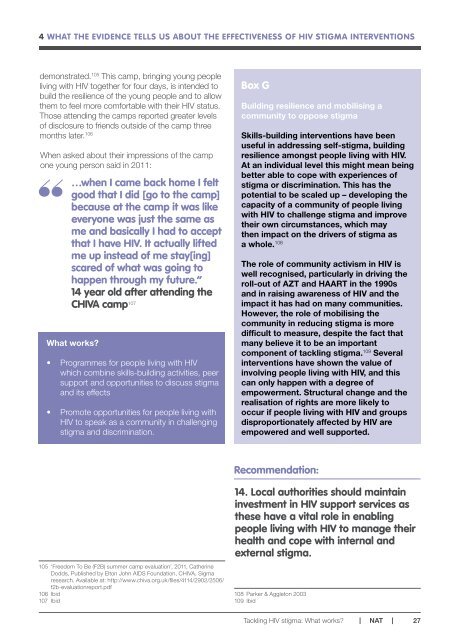Tackling HIV Stigma What works?
Jun_16_Tackling_HIV_Stigma
Jun_16_Tackling_HIV_Stigma
Create successful ePaper yourself
Turn your PDF publications into a flip-book with our unique Google optimized e-Paper software.
4 WHAT THE EVIDENCE TELLS US ABOUT THE EFFECTIVENESS OF <strong>HIV</strong> STIGMA INTERVENTIONS<br />
demonstrated. 105 This camp, bringing young people<br />
living with <strong>HIV</strong> together for four days, is intended to<br />
build the resilience of the young people and to allow<br />
them to feel more comfortable with their <strong>HIV</strong> status.<br />
Those attending the camps reported greater levels<br />
of disclosure to friends outside of the camp three<br />
months later. 106<br />
When asked about their impressions of the camp<br />
one young person said in 2011:<br />
…when I came back home I felt<br />
good that I did [go to the camp]<br />
because at the camp it was like<br />
everyone was just the same as<br />
me and basically I had to accept<br />
that I have <strong>HIV</strong>. It actually lifted<br />
me up instead of me stay[ing]<br />
scared of what was going to<br />
happen through my future.”<br />
14 year old after attending the<br />
C<strong>HIV</strong>A camp 107<br />
<strong>What</strong> <strong>works</strong>?<br />
• Programmes for people living with <strong>HIV</strong><br />
which combine skills-building activities, peer<br />
support and opportunities to discuss stigma<br />
and its effects<br />
• Promote opportunities for people living with<br />
<strong>HIV</strong> to speak as a community in challenging<br />
stigma and discrimination.<br />
Box G<br />
Building resilience and mobilising a<br />
community to oppose stigma<br />
Skills-building interventions have been<br />
useful in addressing self-stigma, building<br />
resilience amongst people living with <strong>HIV</strong>.<br />
At an individual level this might mean being<br />
better able to cope with experiences of<br />
stigma or discrimination. This has the<br />
potential to be scaled up – developing the<br />
capacity of a community of people living<br />
with <strong>HIV</strong> to challenge stigma and improve<br />
their own circumstances, which may<br />
then impact on the drivers of stigma as<br />
a whole. 108<br />
The role of community activism in <strong>HIV</strong> is<br />
well recognised, particularly in driving the<br />
roll-out of AZT and HAART in the 1990s<br />
and in raising awareness of <strong>HIV</strong> and the<br />
impact it has had on many communities.<br />
However, the role of mobilising the<br />
community in reducing stigma is more<br />
difficult to measure, despite the fact that<br />
many believe it to be an important<br />
component of tackling stigma. 109 Several<br />
interventions have shown the value of<br />
involving people living with <strong>HIV</strong>, and this<br />
can only happen with a degree of<br />
empowerment. Structural change and the<br />
realisation of rights are more likely to<br />
occur if people living with <strong>HIV</strong> and groups<br />
disproportionately affected by <strong>HIV</strong> are<br />
empowered and well supported.<br />
Recommendation:<br />
105 ‘Freedom To Be (F2B) summer camp evaluation’, 2011, Catherine<br />
Dodds, Published by Elton John AIDS Foundation, C<strong>HIV</strong>A, Sigma<br />
research. Available at: http://www.chiva.org.uk/files/4114/2902/2506/<br />
f2b-evaluationreport.pdf<br />
106 Ibid<br />
107 Ibid<br />
14. Local authorities should maintain<br />
investment in <strong>HIV</strong> support services as<br />
these have a vital role in enabling<br />
people living with <strong>HIV</strong> to manage their<br />
health and cope with internal and<br />
external stigma.<br />
108 Parker & Aggleton 2003<br />
109 Ibid<br />
<strong>Tackling</strong> <strong>HIV</strong> stigma: <strong>What</strong> <strong>works</strong>? NAT 27


